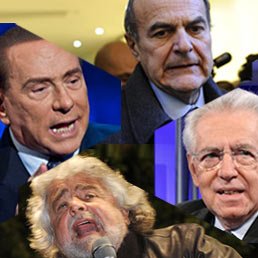Markets affected by Italian election deadlock
European markets have opened lower, with the inconclusive election result in Italy raising fears that political deadlock will delay economic reforms.
Italy’s FTSE MIB index fell 4.7%, while London’s FTSE 100 shed 1.5% and share markets in Frankfurt and Paris also fell more than 2% at the start.
The yield on Italian government bonds also rose sharply, implying markets are more wary of lending to Italy.
Earlier, stock markets in Asia had closed lower.
Japan’s main Nikkei 225 stock index lost 2.2%, Hong Kong’s Hang Seng fell 0.8% and Australia’s ASX was down 1%.
Oil prices also dropped, hit by worries that uncertainty in the eurozone could hit demand, with Brent crude falling 87 cents to $113.57 a barrel.
With all domestic votes counted in Italy’s parliamentary election, the centre-left bloc won the lower house by a tiny margin, but did not secure a majority in the Senate.
Fears are that a split parliament will make it harder for one group to push through their plans to revive the economy, and that may stall Italy’s process of cutting its public debt levels.
Banks were the biggest fallers on the stock markets, with shares in major banks across Europe down more than 4%.
The yield on Italian 10-year government bonds rose to 4.77% from 4.48%, and the gap between the yield on Italian and German 10-year bonds widened.

European markets have opened lower, with the inconclusive election result in Italy raising fears that political deadlock will delay economic reforms
Former Prime Minister Silvio Berlusconi, who has conceded the lower house to Pier Luigi Bersani’s centre-left bloc, played down the significance of the spread, and said he was not worried about market reaction to the vote.
But Spanish Foreign Minister Jose Manuel Garcia-Margallo said there was “extreme concern” over possible movements in bond spreads as a reaction to the results.
“This is a jump to nowhere that does not bode well either for Italy or for Europe,” he said.
Giuseppe Fontana, professor of monetary economics at Leeds University Business School, said Italian voters had sent a “chilling message” to the markets and policy makers.
Georg Grodzki, head of credit research at Legal & General Investment Management, said the Italian result would leave markets guessing for a while.
“Uncertainty is not good for confidence. It’s not bad enough for an immediate abrupt sell-off but it could well build over the next few months into some crisis,” he said.
With political instability likely to continue at least in the near term, Angus Campbell from Capital Spreads said: “The uncertainty that this causes is enough to make anyone nervous and we are likely to see an interim administration for a number of months before fresh elections, unless a working coalition can be formed.”
For more than a year Italy was led by technocrat Mario Monti, appointed after Silvio Berlusconi’s resignation in November 2011 amid an acute debt crisis.
He was tasked with reforming the economy, and introduced unpopular economic austerity measures, implementing spending cuts and tax rises.
Mario Monti resigned in December after Mr Berlusconi’s conservative party withdrew its support from his government. Although he ran in the latest election, his bloc won only 10% of the vote, with the majority of voters rejecting austerity.
Ishaq Siddiqi, market strategist at ETX Capital, warned of future turmoil in Italy.
“What is more worrying for investors is that the political deadlock in Italy would suggest that even if we do see a market-friendly scenario materialize with a reform-minded government taking control, the fact that Berlusconi managed to gain such an influence with his anti-austerity campaign means that we are likely to see a rise in civil unrest in Italy.”
Investors are now looking towards a testimony later on Tuesday from US Federal Reserve chairman Ben Bernanke.
Global markets were shaken last week by an indication from the Fed that it might scale back its strong monetary stimulus sooner than expected.
